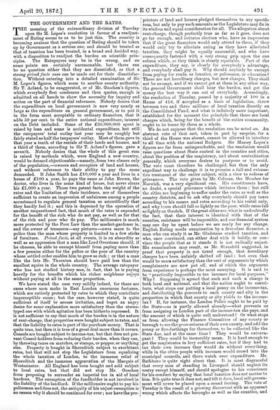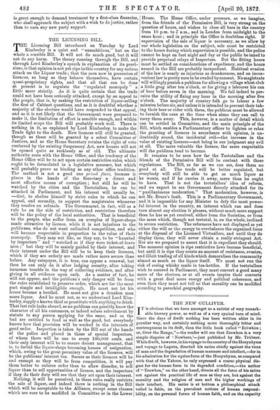THE GOVERNMENT AND THE RATES.
THE meaning of the extraordinary division of Tuesday upon Sir M. Lopes's resolution in favour of a readjust- ment of Rating seems to us to be just this The country is becoming anxious that the question of Rating should be taken up by Government as a serious one, and should be treated as that of taxation has been treated, in a broad and decided way,
with a disposition to readjust the burden on scientific prin- ciples. The Ratepayers may be in the wrong, and on
some points are certainly unreasonable, but there can be no question either that they are dissatisfied, or that a strong primd facie case can be made out for their dissatisfac- tion. Without entering into a detailed examination of Sir M. Lopes's figures, which seem to another county authority, Sir T. Arland, to be exaggerated, or of Mr. Goschen's figures,
which everybody first condemns and then quotes, enough is admitted on all hands to show the necessity for inquiry and action on the part of financial reformers. Nobody denies that the expenditure on local government is now very nearly as large as the expenditure on general government, or to put it in the form most acceptable to ordinary financiers, that it adds 50 per cent. to the entire national expenditure, interest on the Debt included. Some of the £36,000,000 spent is raised by loan and some is accidental expenditure, but still the ratepayers' total outlay last year may be roughly but
fairly stated as half the taxpayers' outlay. Most of them gave in that year a tenth of the rentals of their lands and houses, and a third of them, according to Sir T. Acland's figures, gave a seventh. Nobody denies that the whole of this great sum is raised by methods which, were England a new country, would be deemed objectionable—namely, from two classes only of the population,—owners and occupiers of land and houses, and without reference to their ability to pay the sums demanded. If John Smith has £10,000 a year and lives in a house of £100 a year, he pays the same as John Brown, the doctor, who lives in the same kind of house, but never clears his £1,000 a year. Those two patent facts, the weight of the rates and the limitation of their incidence, are of themselves sufficient to create an impression of unfairness among a people accustomed to regulate general taxation so scientifically that they hardly feel it ; and this is depeened by the operation of another unquestioned fact, that much of the rates is expended for the benefit of the rich who do not pay, as well as for that of the rich and poor who do pay. The millionaire is much more protected by the Poor Law than the market-gardener is, and the owner of treasures—say pictures—owes more to the police than the man whose property is limited to a few sticks of furniture. Prima facie, at all events, it is an absurdity as well as an oppression that a man like Lord Overstone should, if he chooses, be able to exempt himself from paying more than a few pennies either for the police or the poor of the country whose settled order enables him to grow so rich ; or that a man like the late Mr. Thornton should have paid less than the smallest squire in the whole country. The average ratepayer who has not studied history sees, in fact, that he is paying heavily for the benefits which his richer neighbour enjoys without paying at all in the same proportion.
We have stated the case very mildly indeed, for there are cases where men make in East London enormous fortunes, which are entirely protected by rates to which they contribute imperceptible sums ; but the case, however stated, is quite sufficient of itself to arouse irritation, and beget an angry desire for some explanation more satisfactory than the stereo- typed one with which agitation has been hitherto repressed. It is not sufficient to say that much of the burden is in the nature of rent-charge, that properties were bought subject to rates, and that the liability to rates is part of the purchase money. That is quite true, but then it is true of a great deal more than it covers. Consols are bought subject to income-tax, but that does not pre- vent Consol-holders from reducing their burden, when they can, by throwing taxes on matches, or stamps, or pepper, or anything else. Property is bought in Shoreditch subject to exorbitant rates, but that will not stop the Legislature from equalizing the whole taxation of London, to the immense relief of Shoreditch and the immense aggravation of the Marquis of Westminster. All England has been bought and sold subject to local rates, but that did not stop Mr. Goschen from proposing to surrender an imperial tax in aid of local burdens. The exemption of the fundholder is not involved in the liability of the landlord. If the millionaire ought to pay his policeman and does not, the antiquity of his unjust exemption is no reason why it should be continued for ever ; nor have the pro- prietors of land and houses pledged themselves to any specific sum, but only to pay such amounts as the Legislature may fix in its wisdom and equal consideration for all. The allegation about rent-charge, though perfectly true as far as it goes, does not go far enough, and irritates electors who, have an impression that if the great financiers would only attend to them, if they would only try to alleviate rating as they have alleviated taxation, they might be equally successful, and who have consequently fastened with a very strong grip upon the one reform which, as they think, is clearly equitable. Part of the expenditure, they say, is clearly for everybody's advantage, and everybody shall pay it. Why should anybody be exempt from paying for roads, or lunatics, or policemen, or education? These are not hereditary charges, but new charges. They shall not be exempt, and if we cannot get at them in any other way, the general Government shall bear the burden, and get the money the best way it can out of everybody. Accordingly,
the resolution of Tuesday, passed by a majority of 100 in a
House of 418, if accepted as a basis of legislation, threw between two and three millions of local taxation directly on the Consolidated Fond, and what is infinitely more important, established for the moment the principle that there are local charges which, being for the benefit of the entire community, ought to be borne by them as a whole.
We do not suppose that the resolution can be acted on. An abstract vote of that sort, taken in part by surprise, for a third of the House was absent, cannot be allowed to interfere to all time with the national Budgets. Sir Massey Lopes's figures are far from unimpeachable, and the resolution would raise questions about State control in the counties and cities, about the position of the magistracy, and about centralization generally, which everyone desires to postpone or to avoid. The vote must therefore be challenged, but then the only expedient way to challenge it is to promise a full and exhaus- tive treatment of the entire subject, with a view to redress of grievances. The vote given by Mr. Colman, the Member for Norwich, was a very significant one. His constituents have, no doubt, a special grievance which irritates them ; but still the cities are beginning to suffer under the rates as well as the country districts, and to ask why everybody should pay taxes according to his means and rates according to his rental only, and why taxes should fall so lightly on the poor, while rates fall so lightly on the rich. If the great cities see, what is undoubtedly the fact, that their interest is identical with that of the counties, resistance will be impossible, and our financial system may one day be upset before we are ready for any change. English Rating needs examination by a first-class financier, a man who can study it as Mr. Gladstone studied taxation, and who, once convinced, can either deal with it boldly, or con- vince the people that as it stands it is not radically unjust. His examination may result, as Mr. Stansfeld suggested, in proof that property is not taxed enough, that hereditary charges have been unfairly shifted off land ; but even that would be more satisfactory than the sort of arguments by which complainants are now put off, and of which the argument from experience is perhaps the most annoying. It is said to be "practically impossible to tax incomes for local purposes." Why ? Supposing it agreed that such and such a charge is both local and national, and that the nation ought to contri- bute, what stops our putting a local penny on the income-tax, and distributing the proceeds to each county and city in the proportion in which that county or city yields to the income- tax ? If, for instance, the London Police ought to be paid by the State—as is partly allowed already—what prevents us from assigning to London part of the income-tax she pays, and the amount of which is quite well understood V Or what stops us from allowing the Finance Committee of any county or borough to see the gross returns of their own county, and add the penny or five-farthings for themselves, to be collected like the State due, and at the same time ? They would be extrava- gant ? They would be inexorably mean. It is hard enough to
get the magistrates to levy sufficient rates, but if they had to tax their own incomes they would do without everything, while in the cities people with incomes would crowd into the municipal councils, and there watch over expenditure. Mr. Rathbone is quite right about that. It is most disgraceful that every man of standing in Liverpool should neglect its vestry except himself, and should apologise to his conscience for his conduct by saying that local taxation does not matter to him. Itis quite true it does not, and till it does, local self-govern- ment will never be placed upon a sound footing. The vote of Tuesday is the result of a growing discontent with an apparent wrong which affects the boroughs as well as the counties, and is great enough to demand treatment by a first-class financier, who shall approach the subject with a wish to do justice, rather than to earn any new party support.



































 Previous page
Previous page